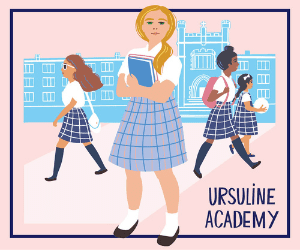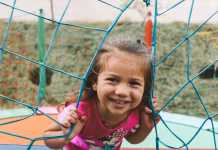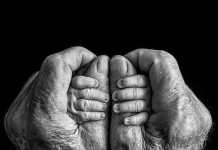I was in my early 30s and in great shape when I got pregnant the first month we tried, and I thought I had this in the bag. I tracked my calcium and iron intake and registered with midwives, planning a low-key natural birth. When I found out I was having fraternal twins, after a few hours of stunned silence, I ordered books on healthy twin pregnancy and convinced the midwives to keep me on board.
I was at Slice Pizzeria on St. Charles when something felt funny. I was only 24 weeks pregnant, but one of my amniotic sacs broke. The first 48 hours were terrifying; we had to decide what would happen to “Baby B” if I went into labor with “Baby A,” and what would happen to both babies if something went wrong with me. The L&D team stabilized all of us and put me on hospital bedrest. But Baby A was determined to come out, got stuck, and my 2.5lb twins were born via emergency C-section at 29 weeks 4 days. After 20 minutes wondering if they were alive, I saw them for the first time in incubators with breathing tubes. I felt fear, guilt, and confusion – but also overwhelming love.
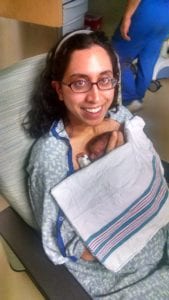 The day I was discharged registers as one of the worst of my life. Leaving the maternity wing without my babies, in my emotional and hormonal state, still physically recovering from a painful delivery, and leaving my babies alone in the NICU (admittedly with an amazing care team) without even holding one of them yet was devastating. I threw all my efforts into pumping breastmilk, but that didn’t go as planned, either. I pushed my body so hard, I ended up back in L&D when my C-section scar burst. At every turn, the guilt was there. My body was failing me and my babies on multiple levels.
The day I was discharged registers as one of the worst of my life. Leaving the maternity wing without my babies, in my emotional and hormonal state, still physically recovering from a painful delivery, and leaving my babies alone in the NICU (admittedly with an amazing care team) without even holding one of them yet was devastating. I threw all my efforts into pumping breastmilk, but that didn’t go as planned, either. I pushed my body so hard, I ended up back in L&D when my C-section scar burst. At every turn, the guilt was there. My body was failing me and my babies on multiple levels.
I was lucky to have a large support system, but being a NICU mom was still isolating, since no one I knew understood what I was going through. My mom found a group of preemie parents, including those who have experienced a loss, called Delivering Hope NOLA. I corresponded with a mom of a thriving kid who started out similarly to my babies and attended support group meetings.
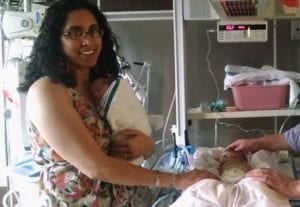 The NICU is a roller coaster, and we celebrated every day that was positive or even stable. My twins progressed at different rates with different setbacks, which was overwhelming at times. They were 7 weeks old the first time they could meet each other; one mastered basic breathing more quickly than the other, and the remaining wires could stretch across the room. The scariest was when one had PDA surgery.
The NICU is a roller coaster, and we celebrated every day that was positive or even stable. My twins progressed at different rates with different setbacks, which was overwhelming at times. They were 7 weeks old the first time they could meet each other; one mastered basic breathing more quickly than the other, and the remaining wires could stretch across the room. The scariest was when one had PDA surgery.
The first year after they came home was a blur of sleeplessness and worrying about RSV, but we were happy to be home together. We navigated through developmental delays and a barrage of medical specialists. As the babies slowly started to improve, I thought I would, too. But I couldn’t conquer the feeling that this was all my fault. Like many NICU moms, I was also grieving the loss of a “normal” pregnancy, delivery, and life with a baby, while still feeling grateful that my babies were alive and getting healthier. Even though we were out of the NICU, my mental health was still on a roller coaster.
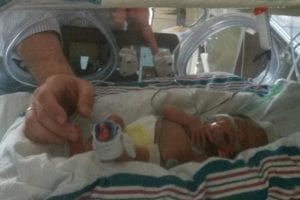 At a dinner party, a judgmental comment that I might have shrugged off in a better mental state instead had me sobbing in a bedroom. That was when I realized I needed professional help. I sought out (and made time for) a therapist, and over 6 months, learned how to process my feelings of guilt and inadequacy. I finally let myself believe what my support system had been saying all along – that what happened wasn’t my fault, and instead of feeling like a failure, I realized that I am the best champion for my kids and their needs.
At a dinner party, a judgmental comment that I might have shrugged off in a better mental state instead had me sobbing in a bedroom. That was when I realized I needed professional help. I sought out (and made time for) a therapist, and over 6 months, learned how to process my feelings of guilt and inadequacy. I finally let myself believe what my support system had been saying all along – that what happened wasn’t my fault, and instead of feeling like a failure, I realized that I am the best champion for my kids and their needs.
My twins closed the developmental gaps around age 2 and are healthy, happy, and thriving. Medical issues related to their prematurity still arise, but I have a better handle on my mental health and can focus on helping them continue to learn and grow.
There is tons of research on PTSD in NICU parents, which is different than PPD. It also affects fathers and partners, as they feel helpless not only regarding their babies but the mothers, too. Experts are actually recommending that mental health professionals are hired as NICU staff for the parents (Journal of Perinatology 2015). The 2008 mental health parity law requires insurance companies, including most Medicaid programs, to treat mental health coverage equal to medical coverage. So fellow NICU parents, know that you are not alone, and don’t be afraid or ashamed to ask for help.
About Meghana
 Meghana was born and raised in Kenner from immigrant parents and attended LSMSA and Tulane. After moving to the Midwest for grad school, she realized that she could only marry someone who had grown up in the Greater New Orleans area and understood how important it was to have a favorite po-boy shop. She and her husband spent a few years in NYC before settling back in NOLA. They are grateful to have both sides of the family around to help raise their twins!
Meghana was born and raised in Kenner from immigrant parents and attended LSMSA and Tulane. After moving to the Midwest for grad school, she realized that she could only marry someone who had grown up in the Greater New Orleans area and understood how important it was to have a favorite po-boy shop. She and her husband spent a few years in NYC before settling back in NOLA. They are grateful to have both sides of the family around to help raise their twins!











